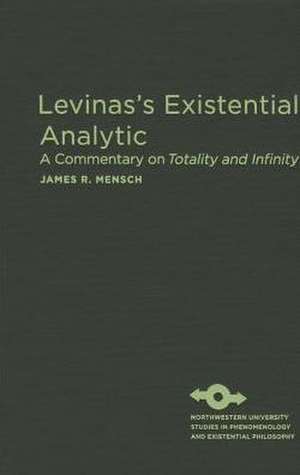Levinas's Existential Analytic: A Commentary on Totality and Infinity: Studies in Phenomenology and Existential Philosophy
Autor James R. Menschen Limba Engleză Hardback – 30 ian 2015
By virtue of the originality and depth of its thought, Emmanuel Levinas’s masterpiece, Totality and Infinity: An Essay on Exteriority, is destined to endure as one of the great works of philosophy. It is an essential text for understanding Levinas’s discussion of “the Other,” yet it is known as a “difficult” book. Modeled after Norman Kemp Smith’s commentary on Kant’s Critique of Pure Reason, Levinas’s Existential Analytic guides both new and experienced readers through Levinas’s text. James R. Mensch explicates Levinas’s arguments and shows their historical referents, particularly with regard to Heidegger, Husserl, and Derrida. Students using this book alongside Totality and Infinity will be able to follow its arguments and grasp the subtle phenomenological analyses that fill it.
Din seria Studies in Phenomenology and Existential Philosophy
-
 Preț: 180.24 lei
Preț: 180.24 lei -
 Preț: 194.88 lei
Preț: 194.88 lei -
 Preț: 329.98 lei
Preț: 329.98 lei -
 Preț: 255.61 lei
Preț: 255.61 lei -
 Preț: 314.27 lei
Preț: 314.27 lei -
 Preț: 260.62 lei
Preț: 260.62 lei -
 Preț: 306.60 lei
Preț: 306.60 lei -
 Preț: 339.71 lei
Preț: 339.71 lei -
 Preț: 272.32 lei
Preț: 272.32 lei -
 Preț: 250.29 lei
Preț: 250.29 lei -
 Preț: 265.88 lei
Preț: 265.88 lei -
 Preț: 221.59 lei
Preț: 221.59 lei -
 Preț: 215.68 lei
Preț: 215.68 lei -
 Preț: 275.22 lei
Preț: 275.22 lei -
 Preț: 245.79 lei
Preț: 245.79 lei -
 Preț: 269.44 lei
Preț: 269.44 lei -
 Preț: 215.68 lei
Preț: 215.68 lei -
 Preț: 240.26 lei
Preț: 240.26 lei -
 Preț: 235.17 lei
Preț: 235.17 lei -
 Preț: 223.63 lei
Preț: 223.63 lei -
 Preț: 248.25 lei
Preț: 248.25 lei -
 Preț: 226.89 lei
Preț: 226.89 lei -
 Preț: 137.25 lei
Preț: 137.25 lei -
 Preț: 240.01 lei
Preț: 240.01 lei -
 Preț: 165.56 lei
Preț: 165.56 lei -
 Preț: 242.69 lei
Preț: 242.69 lei - 18%
 Preț: 698.04 lei
Preț: 698.04 lei -
 Preț: 195.68 lei
Preț: 195.68 lei -
 Preț: 267.53 lei
Preț: 267.53 lei -
 Preț: 223.63 lei
Preț: 223.63 lei -
 Preț: 220.74 lei
Preț: 220.74 lei -
 Preț: 314.03 lei
Preț: 314.03 lei - 21%
 Preț: 480.24 lei
Preț: 480.24 lei - 11%
 Preț: 274.46 lei
Preț: 274.46 lei - 11%
 Preț: 214.35 lei
Preț: 214.35 lei - 10%
 Preț: 232.06 lei
Preț: 232.06 lei - 11%
 Preț: 229.67 lei
Preț: 229.67 lei - 6%
 Preț: 331.25 lei
Preț: 331.25 lei - 36%
 Preț: 165.14 lei
Preț: 165.14 lei -
 Preț: 139.02 lei
Preț: 139.02 lei - 11%
 Preț: 228.57 lei
Preț: 228.57 lei - 12%
 Preț: 204.99 lei
Preț: 204.99 lei - 13%
 Preț: 252.48 lei
Preț: 252.48 lei - 13%
 Preț: 251.36 lei
Preț: 251.36 lei - 23%
 Preț: 588.68 lei
Preț: 588.68 lei
Preț: 525.24 lei
Preț vechi: 688.30 lei
-24% Nou
Puncte Express: 788
Preț estimativ în valută:
100.51€ • 104.34$ • 83.81£
100.51€ • 104.34$ • 83.81£
Carte indisponibilă temporar
Doresc să fiu notificat când acest titlu va fi disponibil:
Se trimite...
Preluare comenzi: 021 569.72.76
Specificații
ISBN-13: 9780810130524
ISBN-10: 0810130521
Pagini: 248
Dimensiuni: 152 x 229 x 20 mm
Greutate: 0.45 kg
Ediția:1
Editura: Northwestern University Press
Colecția Northwestern University Press
Seria Studies in Phenomenology and Existential Philosophy
ISBN-10: 0810130521
Pagini: 248
Dimensiuni: 152 x 229 x 20 mm
Greutate: 0.45 kg
Ediția:1
Editura: Northwestern University Press
Colecția Northwestern University Press
Seria Studies in Phenomenology and Existential Philosophy
Notă biografică
JAMES R. MENSCH is a professor of philosophy at Charles University in the Czech Republic. His books include, most recently, Husserl’s Account of our Consciousness of Time (2010) and Embodiments: From the Body to the Body Politic (Northwestern, 2009).
Recenzii
"James R. Mensch has produced an excellent book, one that deserves serious consideration and study by generalists, specialists, and/or students who might be somewhere in between.” —Notre Dame Philosophical Review
"Mensch does a brilliant job of explicating Levinas’s philosophical background” —The Times Literary Supplement
"The aim of Mensch’s commentary is clear: to help students follow the complex arguments and subtle phenomenological analyses that pervade Levinas’ major work, Totality and Infinity. While this task is in many ways fulfilled (by providing, for example, helpful background information on Levinas’ relationship to Heidegger and Husserl), the work also has much to offer specialists within the phenomenological tradition.Positioning his analysis of Totality and Infinity both historically and analytically, Mensch’s work presents a clear portrait of Levinas’ overall aims, as well as detailed analysis of his major themes and his unique conceptual armature (e.g., eros, the face, desire). After a preface and introduction that are largely focused on the relationship between Levinas’ and Heidegger’s respective phenomenologies, the rest of the book’s twelve chapters provide detailed commentary that guides readers through the central movements of Totality and Infinity." —Graduate Faculty Philosophy Journal
Descriere
By virtue of the originality and depth of its thought, Emmanuel Levinas’s masterpiece, Totality and Infinity: An Essay on Exteriority, is destined to endure as one of the great works of philosophy. It is an essential text for understanding Levinas’s discussion of “the Other,” yet it is known as a “difficult” book.
